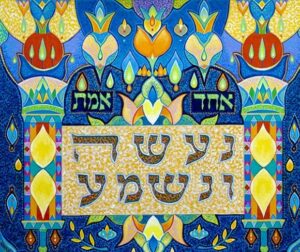בס”ד
By Rabbi Moshe Goodman, Kollel Ohr Shlomo, Hebron

At the end of this parsha the famous words “na’aseh venishma” are mentioned by Israel in their
acceptance of the covenant with Hashem at Mount Sinai. Our Sages discuss the significance of the term
“na’aseh – we will do” preceding the term “nishma – we will listen.” One of the meanings we can gather
from this is that, since an acceptance to obey the commandments implies a deep faithfulness to Hashem’s
command even to the level of one’s conduct and even before one understands/internalizes the command –
implied by “nishma”, therefore this precedence of doing before hearing represents this deep faithfulness
towards Hashem inherent within Israel.
This painting exhibits “na’aseh venishma” within a Torah scroll, which may hint to the idea that the
covenant made between Hashem and Israel through the Torah is intrinsically linked to the deep
faithfulness Israel have towards Hashem and His word, hinted to by these words “na’aseh venishma”.
Above these words we see the word “echad -one”, perhaps hinting to the idea that the “na’aseh
venishma”exclamation expresses our covenant, faithfulness and “oneness” with Hashem. Next to this is
the word “emet-truth” perhaps expressing the truth of the Torah, which also acts as our ovenant with
Hashem. These ieas come together in Hebron, which stands for unity-hibur-”echad”, and also stands for
the truth of the Torah considered synonymous with Hebron as the Zohar says, “Hebron – that is Torah for
one occupied with it is called a haber.”



